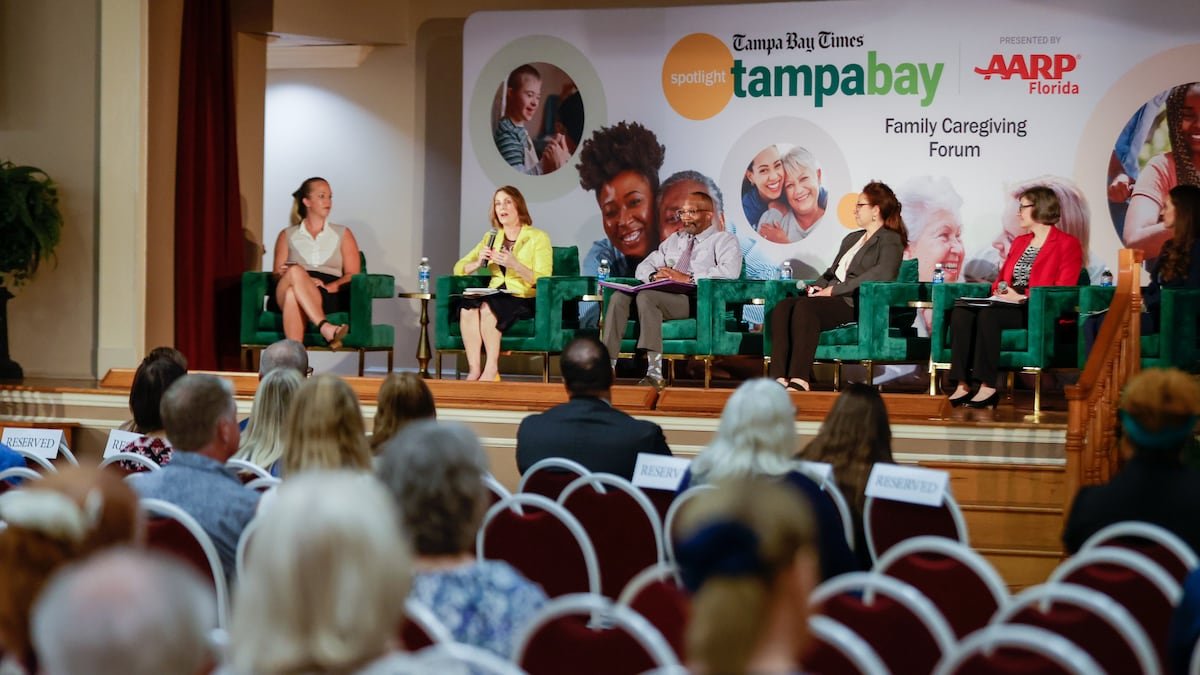Tampa Bay Times forum highlights lack of help for family caregivers

TAMPA — Amanda Singleton was 30 when her mom was diagnosed with a brain tumor and underwent emergency surgery. Doctors said the 60-year-old would likely survive just a few weeks.
Singleton decided she would take care of her mother for whatever days she had left. It ended up being a year-long commitment, opening the St. Petersburg attorney’s eyes to the enormous burden and lack of help for those who devote themselves to caring for incapacitated loved ones.
She now serves as an AARP caregiving expert, writing on legal and financial issues affecting caregivers.
“I was thrust very suddenly into the world of caregiving and then lived there for many years after,” Singleton said. “It completely derailed my life.”
More than 2.7 million Floridians — roughly 12% of the state’s population — are caregivers to loved ones who can no longer live independently, according to an AARP study. The hours they put in driving to medical appointments, dealing with billing and other paperwork and providing hands-on care is valued by the study at $40 billion.
But help is so limited and hard to find for those who take on the role that many Americans are unprepared for the burden it places on their lives, according to a panel of experts who participated in a Spotlight Tampa Bay forum Wednesday night at Higgins Hall, which was presented by AARP Florida and hosted by the Tampa Bay Times.
The result is that careers and relationships often suffer and caregivers themselves can suffer from stress and anxiety, and are at risk of burnout.
“One person cannot care give 24 hours a day and keep all the other balls of their life up in the air,” Singleton said. “It is just too hard.”
Connecting caregivers with the support that is out there is critical, said Rhonda Richards, an AARP government affairs director. For example, under a new rule that took effect this year, caregivers can get training from clinical psychologists, nurse practitioners, physical therapists and other health care providers with Medicare picking up the bill for their time.
Training can range from how to do daily activities like helping someone bathe or how to lift them from the bed to a chair, to behavior management and modification for a relative who has Alzheimer’s disease or other mental health challenges. A proposal to make some of those services available through telehealth is in the works, as well as one to expand training to include more medical and nursing tasks, Richards said.
“So if you need help with infection control or wound care or other different things like that, Medicare would help pay health care professionals to show you how to do that,” she said.
The panelists urged caregivers to attend support groups for caregivers or find online groups like the AARP family caregivers discussion group on Facebook.
Keep up with Tampa Bay’s top headlines
Subscribe to our free DayStarter newsletter
We’ll deliver the latest news and information you need to know every morning.
You’re all signed up!
Want more of our free, weekly newsletters in your inbox? Let’s get started.
Explore all your optionsResidents listen to a panel of speakers at the Spotlight Tampa Bay Family Caregiving Forum on Wednesday at Higgins Hall in Tampa. [ LUIS SANTANA | Times ]
“You should never feel like you have to deal with this by yourself,” said Keith Gibson, director of diversity, equity and inclusion with the Alzheimer’s Association.
Gibson said people who suddenly thrust themselves into the role of caregiver must ask themselves tough questions, one of them being whether they are up to the challenge. Those who decide they’re not can still be involved in managing the care of their loved ones.
“If you’re not, it’s OK, at least you’re being honest and saying, ‘Hey, listen, I was not cut out for this,’” he said.
In addition to the emotional burden, caregivers sometimes struggle to afford needed medical expenses, especially if their loved ones are ineligible for government benefits. Higher inflation after the pandemic has added to that burden, panelists said. Families need to make $11,500 more a year just to maintain their 2021 standard of living, according to an analysis from Republican members of the U.S. Senate Joint Economic Committee.
The cost of care could also be covered by Medicaid in some cases, but that is not an option for an estimated 400,000 low-income Floridians because state lawmakers have repeatedly refused to expand the program’s eligibility as allowed under the Affordable Care Act.
Republican leaders have said they oppose expansion because it would act as a disincentive to finding employment and increase dependence on government programs. But U.S. Rep. Kathy Castor, D-Tampa, the sole lawmaker on the panel, warned that those who have no health insurance often skip routine health care prevention like screenings, putting them at higher risk of developing serious health conditions that require continuous care.
“What could be worse than having to try to just go clinic to clinic and not get continuity of care, real care, so that you can stay healthy and well and not be a burden on your family,” she said.






